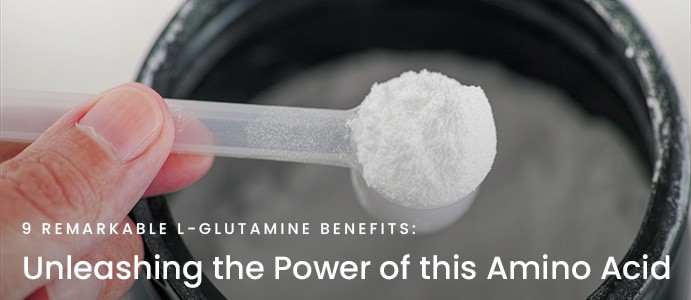
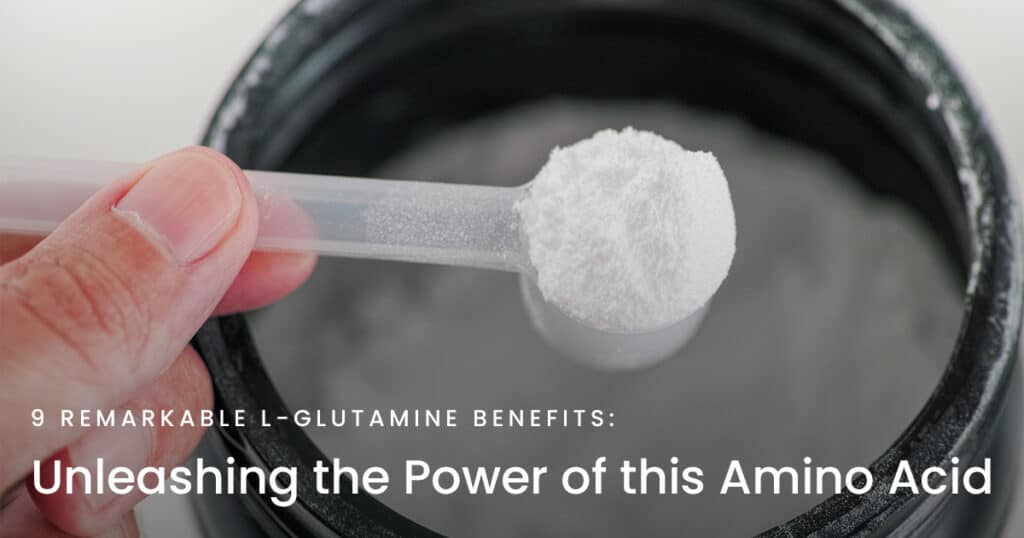
In the realm of health and wellness, the spotlight often shines on popular supplements like vitamins, minerals, and antioxidants. However, other lesser-known compounds play equally crucial roles in maintaining our well-being. One such compound is L-Glutamine, an amino acid that, despite its importance, often flies under the radar. This article aims to shed light on L-Glutamine, exploring its definition, roles, benefits, and potential side effects. By the end of this article, you’ll have a pretty good understanding of why L-Glutamine is a vital player in our body’s functioning and how it can contribute to your health journey.
What is L-Glutamine?
L-glutamine is a conditionally essential amino acid, meaning that while our bodies can typically produce it, there are times—such as during intense stress or illness—when we may need to obtain it from our diet or supplements. It serves as a building block of protein and plays a vital role in various bodily functions.
One of L-Glutamine’s most significant roles is its function as a precursor for the production of two critical neurotransmitters in our brain: glutamate and GABA (γ-aminobutyric acid)[1]Holten, A. T., & Gundersen, V. (2008). Glutamine as a precursor for transmitter glutamate, aspartate and GABA in the cerebellum: a role for phosphate-activated glutaminase. Journal of Neurochemistry, 104(4), 1032-1042.. Neurotransmitters are chemical messengers that transmit signals across nerve cells, playing a pivotal role in everything from our thoughts and feelings to our physical coordination.
Glutamate is the most abundant amino acid in our brain and acts as an excitatory neurotransmitter, promoting the firing of neurons. On the other hand, GABA serves as an inhibitory neurotransmitter, reducing neuron activity and helping us relax. The balance between these two neurotransmitters—glutamate and GABA—is crucial for optimal brain function[2]Sears, S. M., & Hewett, S. J. (2021). Influence of glutamate and GABA transport on brain excitatory/inhibitory balance. Experimental Biology and Medicine, 246(9), 1069-1083.. Too much glutamate can overexcite our neurons and lead to neurotoxicity, while too little can result in insufficient neuron signalling.
L-glutamine plays a critical role in maintaining this delicate balance. By understanding and harnessing the power of L-Glutamine, we can potentially optimize our brain health, improve our mental performance, and enhance our overall well-being.
Who Mostly Uses L-Glutamine?
L-glutamine has long been a staple in the athletic and bodybuilding communities. Its popularity in these circles stems from its role in protein synthesis and muscle recovery. After a strenuous workout, the body’s glutamine levels can drop significantly, and this can impact muscle recovery. Supplementing with L-Glutamine helps replenish these levels, promoting faster recovery and aiding in muscle growth. Moreover, L-glutamine has been associated with boosting Human Growth Hormone (HGH), a hormone that plays a key role in muscle development and recovery.
Despite its widespread use among athletes and bodybuilders, L-Glutamine’s potential extends far beyond the realm of physical fitness. In the nootropics community—groups interested in cognitive enhancement—L-Glutamine is often overlooked. This is surprising given its critical role in brain health and function. As a precursor to the neurotransmitters glutamate and GABA, L-Glutamine can influence various cognitive processes, including alertness, concentration, focus, memory, and mood.
The underutilization of L-Glutamine in the nootropics community presents an opportunity for individuals seeking to enhance their cognitive performance. By incorporating L-Glutamine into their nootropic stack—a combination of cognitive-enhancing substances—individuals may be able to optimize their brain function and achieve their cognitive goals.
Why Should You Use L-Glutamine?
The importance of L-glutamine to the brain cannot be overstated. As a precursor to the neurotransmitters glutamate and GABA, it plays a pivotal role in maintaining the delicate balance between excitation and inhibition in our brain. This balance is crucial for optimal brain function, influencing everything from our ability to focus and remember to our mood and stress levels.
When this balance is disrupted—such as during periods of high stress or illness—our brain function can suffer. This is where L-glutamine supplementation can come in. By replenishing our body’s L-glutamine levels, we can help restore the balance of neurotransmitters in our brain, potentially improving our cognitive performance and mental well-being.
Moreover, L-Glutamine can be an important addition to a nootropic stack. Nootropics, also known as “smart drugs” or cognitive enhancers, are substances that can improve cognitive function, particularly executive functions, memory, creativity, or motivation. Given L-glutamine’s role in neurotransmitter production and brain function, it can complement other nootropics to enhance their effects.
For instance, if you’re using a nootropic to boost mental energy, such as Resveratrol or PQQ, adding L-Glutamine to your stack can help ensure that your brain has the necessary resources to maintain the glutamine/glutamate cycle, which accounts for a significant portion of cerebral energy consumption.
In summary, whether you’re an athlete looking to improve your recovery, a student seeking to boost your focus for studying, or anyone interested in optimizing brain health, L-Glutamine can be a valuable addition to your health regimen.
L-Glutamine Benefits
1. Boosts Neurotransmitters
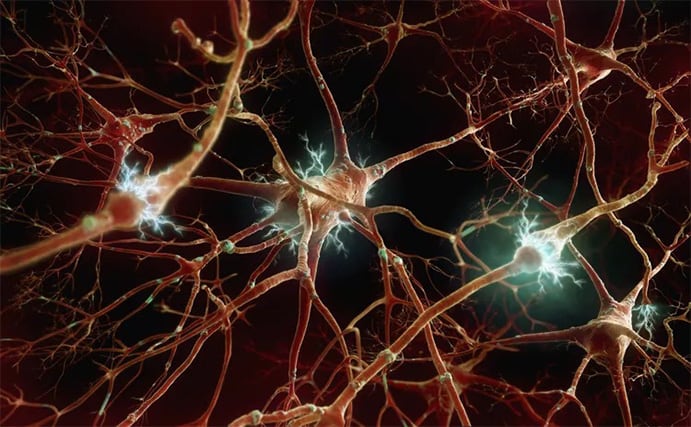
L-glutamine plays a crucial role in the production of neurotransmitters in the brain. It serves as a precursor to the excitatory amino acid and neurotransmitter glutamate and aspartate, as well as the inhibitory amino acid and neurotransmitter GABA[3]Andersen, J. V., & Schousboe, A. (2023). Milestone Review: Metabolic dynamics of glutamate and GABA mediated neurotransmission – The essential roles of astrocytes. Journal of Neurochemistry.. By influencing the production and balance of these neurotransmitters, L-Glutamine can significantly impact various cognitive functions, including alertness, concentration, focus, memory, and mood.
2. Reduces Brain Inflammation
Inflammation in the brain can lead to a host of cognitive issues, from memory problems to mood disorders. L-glutamine can help combat this inflammation. It boosts the body’s immune response, increasing the production of antibodies to fight against harmful viruses and bacteria. Furthermore, L-Glutamine helps tame inflammatory cytokines and detoxifies the brain from excess ammonia, converting it into other amino acids, sugars, and urea[4]Cruzat, V., Rogero, M. M., & Keane, K. N., et al. (2018). Glutamine: Metabolism and Immune Function, Supplementation and Clinical Translation. Nutrients, 10(11), 1564.. By reducing brain inflammation, L-Glutamine can help protect cognitive function and mental health.
3. Helps Manage Stress

Stress can take a significant toll on both our physical and mental health. L-glutamine can help manage this stress in several ways. It supplies energy to immune and intestinal cells[5]Cruzat, V., Rogero, M. M., & Keane, K. N., et al. (2018). Glutamine: Metabolism and Immune Function, Supplementation and Clinical Translation. Nutrients, 10(11), 1564., which can become sluggish and dysfunctional during times of stress. By providing these cells with the energy they need, L-Glutamine can help ensure that your body’s immune response remains strong during stressful periods. Additionally, by supporting the balance of neurotransmitters in the brain, L-Glutamine can help promote feelings of calm and relaxation, further helping to manage stress.
4. Balances Glutamine and Glutamate Levels
Maintaining a healthy balance between glutamine and glutamate is crucial for optimal brain function. These two amino acids are involved in a continuous cycle in the brain, with glutamine being converted into glutamate, which is then converted back into glutamine. This cycle is essential for various cognitive processes, including learning, memory, and mood regulation. By supplementing with L-Glutamine, you can help ensure that this cycle continues to function optimally, supporting overall brain health and cognitive performance.
5. Prevents Brain Aging

Emerging research suggests that L-Glutamine may play a role in preventing brain aging[6]Zhou, J., Chen, H., Du, J., Tai, H., Han, X., Huang, N., Wang, X., Gong, H., Yang, M., & Xiao, H. (2022). Glutamine Availability Regulates the Development of Aging Mediated by mTOR Signaling and Autophagy. Frontiers in Pharmacology, 13, 924081.. Mitochondrial dysfunction has been implicated in the loss of brain function in neurodegenerative diseases and aging, leading to an abnormal increase in the excitatory neurotransmitter glutamate. By supporting the balance of glutamate and GABA in the brain, L-Glutamine can help protect against this dysfunction, potentially slowing the process of brain aging and preserving cognitive function.
6. Increases Human Growth Hormone
Human Growth Hormone (HGH) plays a key role in various bodily functions, including muscle growth and recovery. Studies have shown that supplementing with L-Glutamine can significantly increase levels of HGH in the body[7]Tam, C. S., Johnson, W. D., Rood, J., Heaton, A. L., & Greenway, F. L. (2020). Increased human growth hormone following oral consumption of an amino acid supplement: results of a randomized, placebo-controlled, double-blind, crossover study in healthy subjects. American Journal of Therapeutics, 27(4), e333–e337.. This can have a range of benefits, from improved athletic performance and muscle recovery to enhanced fat-burning and weight loss. Additionally, HGH is intricately linked with Brain-Derived Neurotrophic Factor (BDNF), a protein that is involved in brain plasticity and long-term memory, suggesting that L-Glutamine could also have indirect cognitive benefits through its impact on HGH.
7. Improves Cerebral Performance
L-glutamine’s role as a precursor to key neurotransmitters directly impacts cerebral performance. By supporting the production of glutamate and GABA, L-Glutamine can enhance various aspects of cognitive function, including attention, learning ability, and memory. Furthermore, studies have shown that supplementing with L-Glutamine, particularly in combination with other nutrients like Vitamin B3 (niacin), can improve memory and vigour, further enhancing cerebral performance[8]Arwert, L. I., Deijen, J. B., & Drent, M. L. (2003). Effects of an oral mixture containing glycine, glutamine and niacin on memory, GH and IGF-I secretion in middle-aged and elderly subjects. Nutritional Neuroscience, 6(5), 269-75..
8. Helps in Recovery from Workouts
For athletes and fitness enthusiasts, L-Glutamine offers significant benefits. Intense physical activity can deplete the body’s glutamine levels, impacting muscle recovery. Supplementing with L-Glutamine helps replenish these levels, promoting faster recovery and aiding in muscle growth[9]Cruzat, V., Rogero, M. M., & Keane, K. N., et al. (2018). Glutamine: Metabolism and Immune Function, Supplementation and Clinical Translation. Nutrients, 10(11), 1564.. This can lead to improved performance, reduced muscle soreness, and enhanced gains from workout sessions.
9. Improves Alertness, Concentration, Focus, Memory, and Mood

As a nootropic, L-Glutamine can have a profound impact on mental performance. By influencing the production and balance of neurotransmitters in the brain, L-Glutamine can enhance alertness, concentration, and focus, making it a valuable supplement for tasks that require mental clarity and precision. Additionally, it can improve memory, aiding in the retention and recall of information. Lastly, by supporting the balance of excitatory and inhibitory neurotransmitters, L-Glutamine can help regulate mood, potentially reducing anxiety and promoting feelings of calm and well-being.
L-Glutamine Clinical Research
Over the years, numerous studies have been conducted to explore the effects of L-Glutamine, particularly its impact on brain health. For instance, one study found that L-glutamine supplementation could significantly increase levels of Human Growth Hormone, which is linked with the Brain-Derived Neurotrophic Factor, a protein involved in long-term memory[10]Dos Santos Quaresma, M. V. L., Souza, W. Y. G., Lemos, V. A., Caris, A. V., & Thomatieli-Santos, R. V. (2020). The Possible Importance of Glutamine Supplementation to Mood and Cognition in Hypoxia from High Altitude. Nutrients, 12(12), 3627..
Another study conducted in the Netherlands found that a stack containing L-Glutamine, glycine, and niacin could improve memory and vigour in healthy adults. Interestingly, the researchers attributed these benefits not to the increased Human Growth Hormone, but to insulin-like growth factor-I, which was also elevated by the L-Glutamine stack[11]Arwert, L. I., Deijen, J. B., & Drent, M. L. (2003). Effects of an oral mixture containing glycine, glutamine and niacin on memory, GH and IGF-I secretion in middle-aged and elderly subjects. Nutritional Neuroscience, 6(5), 269-275..
In a different study, researchers found that direct infusion of L-Glutamine could reverse impairments induced by a disrupted Glu/Gln cycle in mice, leading them to conclude that neuronal deficiency of L-Glutamine could cause depression[12]Zhao, X., Cao, F., Liu, Q., Li, X., Xu, G., Liu, G., … & Wang, W. (2013). Glutamine Deficiency in the Prefrontal Cortex Increases Depressive-Like Behaviours in Male Mice. Journal of Psychiatry & Neuroscience : JPN, 38(3), 183–191.
These studies, among others, highlight the potential of L-glutamine as a powerful nootropic for enhancing brain health and cognitive performance.
Recommended Dosage of L-Glutamine
The recommended daily dosage of L-Glutamine can vary depending on individual needs and goals. For general health and cognitive enhancement, a daily dosage of 2 to 5 grams is often suggested[13]WebMD. (n.d.). Glutamine: Uses, Side effects, Interactions, Dosage, and Warning. Retrieved July 15, 2023, from https://www.webmd.com/vitamins/ai/ingredientmono-878/glutamine.
For athletes and those engaged in intense physical activity, higher doses of up to 10 grams per day may be beneficial for supporting muscle recovery and growth.
As always, it’s important to start with a lower dose to assess individual tolerance and then adjust as needed. It’s also recommended to consult with a healthcare provider before starting any new supplement regimen, particularly for those with existing health conditions or those taking other medications.
Potential Side Effects of L-Glutamine
While L-glutamine is generally considered safe when taken in recommended doses, some people may experience side effects. These can include nausea, vomiting, flatulence, abdominal pain, constipation, dry mouth, hemorrhoids, dizziness, depression, skin rashes, insomnia, and increased sweating. However, these side effects are rare and often associated with higher doses.
It’s important to note that some individuals should avoid L-glutamine. For instance, recent research has suggested that L-glutamine can stimulate tumour growth, so those dealing with any form of cancer should not use L-glutamine [14]Bott, A. J., Maimouni, S., & Zong, W. X. (2019). The Pleiotropic Effects of Glutamine Metabolism in Cancer. Cancers, 11(6), 804.. Similarly, those with severe liver disease, including hepatic encephalopathy, should avoid L-glutamine. Individuals who are allergic or sensitive to Monosodium Glutamate (MSG) may also be sensitive to L-glutamine, as the body converts it to glutamate. Lastly, if you have a severe mental disorder, including mania, or frequently have seizures, you may want to avoid L-Glutamine.
Types of L-Glutamine to Buy
L-Glutamine is available in various forms, including tablets, capsules, and powders. The most commonly available form of L-Glutamine as a nootropic supplement is called “free form” glutamine.
Another form, Trans-Alanyl or Alanyl-L-Glutamine, is an amino acid attached to another amino acid, which aids in the digestion of the supplement.
When using L-Glutamine to boost athletic performance and speed recovery, both forms of L-Glutamine are best taken right before or after a workout. Using it with small meals before or after your workout session can help support your metabolism and weight loss goals, and assist in muscle building, recovery, and maintenance.
Conclusion
In this article, we’ve navigated through the world of L-Glutamine, a conditionally essential amino acid that plays a crucial role in brain health and cognitive function. From its role as a precursor to key neurotransmitters to its potential for enhancing cerebral performance and aiding in workout recovery, L-Glutamine offers a range of benefits that make it a valuable addition to any nootropic stack.
We’ve also explored the research supporting these benefits, highlighting studies that have shown L-Glutamine’s potential for increasing Human Growth Hormone, improving memory and vigour, and even reversing impairments associated with disrupted Glu/Gln cycles.
While L-glutamine is often overlooked in the nootropics community, its wide-ranging benefits and strong research backing make it a supplement worth considering. Whether you’re an athlete looking to enhance recovery, a student seeking to boost cognitive performance, or simply someone interested in supporting overall brain health, L-Glutamine could be a valuable addition to your regimen.
As always, it’s important to consult with a healthcare provider before starting any new supplement regimen. But with its impressive range of benefits and strong safety profile, L-Glutamine is certainly a supplement worth exploring.
Buy L-Glutamine Online Review Comparison Table
| Product | Company | Quantity | Price | Country | Website |
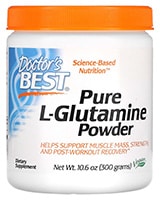 L-Glutamine Powder | iHerb | 10.6 oz (300 g) | $14.28 |  Worldwide, AU | Visit Website >> |
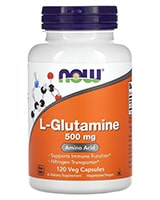 L-Glutamine Capsules | iHerb | 120 pills (500mg) | $9.73 |  Worldwide, AU | Visit Website >> |
References
| ↑1 | Holten, A. T., & Gundersen, V. (2008). Glutamine as a precursor for transmitter glutamate, aspartate and GABA in the cerebellum: a role for phosphate-activated glutaminase. Journal of Neurochemistry, 104(4), 1032-1042. |
|---|---|
| ↑2 | Sears, S. M., & Hewett, S. J. (2021). Influence of glutamate and GABA transport on brain excitatory/inhibitory balance. Experimental Biology and Medicine, 246(9), 1069-1083. |
| ↑3 | Andersen, J. V., & Schousboe, A. (2023). Milestone Review: Metabolic dynamics of glutamate and GABA mediated neurotransmission – The essential roles of astrocytes. Journal of Neurochemistry. |
| ↑4, ↑5, ↑9 | Cruzat, V., Rogero, M. M., & Keane, K. N., et al. (2018). Glutamine: Metabolism and Immune Function, Supplementation and Clinical Translation. Nutrients, 10(11), 1564. |
| ↑6 | Zhou, J., Chen, H., Du, J., Tai, H., Han, X., Huang, N., Wang, X., Gong, H., Yang, M., & Xiao, H. (2022). Glutamine Availability Regulates the Development of Aging Mediated by mTOR Signaling and Autophagy. Frontiers in Pharmacology, 13, 924081. |
| ↑7 | Tam, C. S., Johnson, W. D., Rood, J., Heaton, A. L., & Greenway, F. L. (2020). Increased human growth hormone following oral consumption of an amino acid supplement: results of a randomized, placebo-controlled, double-blind, crossover study in healthy subjects. American Journal of Therapeutics, 27(4), e333–e337. |
| ↑8 | Arwert, L. I., Deijen, J. B., & Drent, M. L. (2003). Effects of an oral mixture containing glycine, glutamine and niacin on memory, GH and IGF-I secretion in middle-aged and elderly subjects. Nutritional Neuroscience, 6(5), 269-75. |
| ↑10 | Dos Santos Quaresma, M. V. L., Souza, W. Y. G., Lemos, V. A., Caris, A. V., & Thomatieli-Santos, R. V. (2020). The Possible Importance of Glutamine Supplementation to Mood and Cognition in Hypoxia from High Altitude. Nutrients, 12(12), 3627. |
| ↑11 | Arwert, L. I., Deijen, J. B., & Drent, M. L. (2003). Effects of an oral mixture containing glycine, glutamine and niacin on memory, GH and IGF-I secretion in middle-aged and elderly subjects. Nutritional Neuroscience, 6(5), 269-275. |
| ↑12 | Zhao, X., Cao, F., Liu, Q., Li, X., Xu, G., Liu, G., … & Wang, W. (2013). Glutamine Deficiency in the Prefrontal Cortex Increases Depressive-Like Behaviours in Male Mice. Journal of Psychiatry & Neuroscience : JPN, 38(3), 183–191 |
| ↑13 | WebMD. (n.d.). Glutamine: Uses, Side effects, Interactions, Dosage, and Warning. Retrieved July 15, 2023, from https://www.webmd.com/vitamins/ai/ingredientmono-878/glutamine |
| ↑14 | Bott, A. J., Maimouni, S., & Zong, W. X. (2019). The Pleiotropic Effects of Glutamine Metabolism in Cancer. Cancers, 11(6), 804. |

Leave a Reply